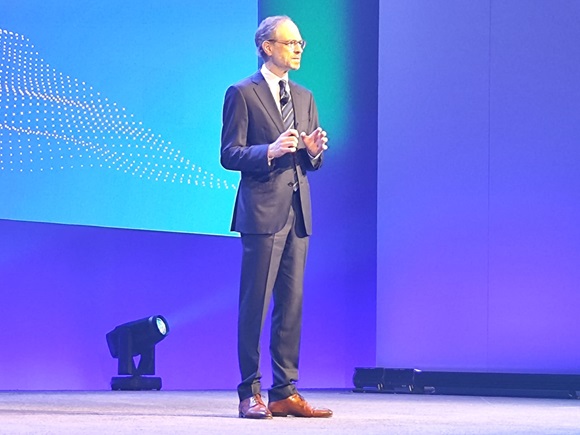Appian World 2024: Live keynote report
Appian World was held this year at the Gaylord Inner Harbor resort in Washington DC from 15-17 April 2024.
Starting off proceedings this year as always was Appian CEO Matt Calkins.
With more than 2000 attendees at this year’s event, the company itself was founded not far away in Virginia some 25 years ago. Talking about the progression of technologies and the company itself over this last quarter century, Calkins said that he loves working at Appian because it is ‘a vehicle for making partnerships’ as the company has grown.
Appian’s core promise is a focus on mission-critical processes and the company now focuses on its data fabric, automation and the deployment of private AI. Today it’s all about generative Artificial Intelligence (gen-AI) – and Calkins reminded us that AI itself is nothing without data, a truism which is now backed up by the fact that companies need to realise that internal data is the most valuable part of the information stream they need to manage.
“Today we need to realise that AI itself needs to be there [in any work environment], but it needs to be ‘part of a team’ where humans are always in place to check on decision making and to form the structure of processes inside which AI exists,” clarified Calkins. “Our process framework makes AI easy to use. But our data fabric gives us a data advantage by giving organisations a common semantic route to using data wherever it resides – as it was unified into one place – even though the data itself remains decentralised when it is unified.”
Moving on to talk about the use of private AI with Retrieval Augmented Generation (RAG), Calkins explained how the Appian data fabric approach is capable of giving the RAG service ‘just the data it needs’ in any given AI algorithm use scenario based upon privacy, access policy etc.
Appian & AWS
Pointing to news covered here on Computer Weekly, the Appian CEO explained his firm’s news of Appian’s strategic agreement with AWS which sees Appian invest resources to find novel ways to combine Appian’s native AI capabilities and the Appian data fabric with the LLMs provided by Amazon Bedrock and the Machine Learning (ML) capabilities from Amazon SageMaker.
Amazon Bedrock is a fully managed service that offers a choice of high-performing Foundation Models (FMs) from AI companies via a single Application Programming Interface (API), along with a set of capabilities that organisations need to build generative AI applications with security, privacy and responsible AI. Amazon SageMaker is a service to build, train, and deploy ML models for any use case with fully managed infrastructure, tools and workflows.
Touring the whole platform in his keynote, Calkins made note of the Appian Starter Kit which features simplified pricing for new users. That pricing simplification has also been carried through to the way Appian says it will now price all customer contracts.
Appian Process HQ
Now that the firm has really evolved its process mining offering and delivered several products in this space, Appian Process HQ encompasses the best of the company’s technologies for enterprise-wide navigation and measurement of organisation’s processes to let management know how teams, departments and individuals are performing as changes are made to processes throughout the natural course of business. All of these tools lead naturally to the optimisation tools available in Process HQ.
Reeling through some of the company’s core product announcements this week, Calkins covered ProcureSight, a solution designed for US federal procurement professionals (one assumes Appain will extend to Europe and elsewhere in time) designed to accelerate the creation of acquisitions and achieve better acquisition outcomes by leveraging historical procurement data in public databases.
Where governments’ mandated procurement processes create an overwhelming documentation burden, referencing previous procurements expedites the process and enables agencies to gain valuable insights into past suppliers, procurement methods and costs etc.
Four founders foundation
Wrapping up his keynote session, Calkins made note of the fact that the original four founders of Appian are all still not only in the company, they all still play key roles in the company’s board focusing on Appian platform roadmap developments.
With this whole event staged around the tagline ‘orchestrate change’, extended sections of the keynote moved onward to feature customer presentations with speakers from organisations such as Telus, a Canadian digital customer experience (CX) company. Also speaking in this section was Dr. Michael Baine, chief technology officer at Axiom Space, also an Appian user – fascinating stuff, although it has to be said, Baine focused more on space exploration than he did process management systems.
Overall look and feel then…?
This was an Appian World keynote designed to showcase, explain and explore Appian’s platform, which – for many people – is a technology base associated with low-code software application development tools. That ‘low-code’ term itself barely featured (and CEO Calkins certainly didn’t use the term or say it out loud) apart from one note when Appian’s top right position was featured in the low-code market analysis presented by magical analyst house Gartner. This was far more Appian the process management company, Appian the AI-enablement company and Appian the data fabric company.
Given the fact that Appian itself was originally built in proximity to a technology base related to a well-known vector database company that still exists today, this is Appian becoming the data company in more direct terms.

Appian CEO Matt Calkins.




